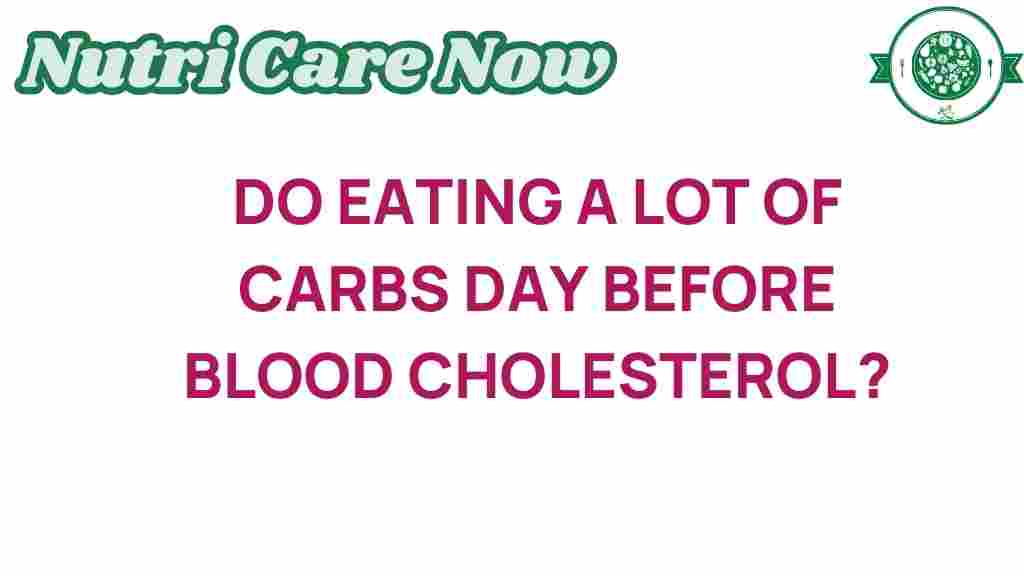The Surprising Impact of Carbs on Your Cholesterol Levels
When it comes to maintaining optimal health, few topics spark as much debate as the role of carbs in our diet. For years, dietary guidelines have focused on the impact of fats on cholesterol levels, but emerging research suggests that carbs may play a more significant role than previously thought. This article will explore how carbs affect your cholesterol levels and overall heart health, delving into the relationship between diet, nutrition, and blood sugar levels.
Understanding Cholesterol and Its Types
Before we can understand the impact of carbs on cholesterol, it’s essential to grasp what cholesterol is and the different types it comprises:
- Low-Density Lipoprotein (LDL): Often referred to as “bad” cholesterol, high levels of LDL can lead to plaque buildup in the arteries, increasing the risk of heart disease.
- High-Density Lipoprotein (HDL): Known as “good” cholesterol, HDL helps remove other forms of cholesterol from your bloodstream.
- Triglycerides: A type of fat found in your blood, high triglyceride levels can also contribute to the hardening of arteries and are often linked with obesity and diabetes.
The Relationship Between Carbs and Cholesterol
Research indicates that the types of carbs you consume can significantly influence your cholesterol levels. Here’s how:
- Refined Carbohydrates: Foods like white bread, pastries, and sugary snacks can lead to spikes in blood sugar levels, which in turn can increase triglycerides and LDL cholesterol.
- Whole Grains: In contrast, whole grains are rich in fiber, which can help lower LDL cholesterol and improve heart health.
- Fruits and Vegetables: High in vitamins, minerals, and fiber, these foods can positively influence cholesterol levels and promote better overall health.
How Diet Affects Your Cholesterol Levels
The dietary impact on cholesterol is multifaceted. Here are the primary ways carbs can influence your cholesterol levels:
1. Insulin Resistance and Blood Sugar Levels
High intake of refined carbs can lead to insulin resistance, a condition where the body becomes less responsive to insulin. This can result in:
- Elevated blood sugar and insulin levels.
- Increased triglycerides.
- Higher LDL cholesterol levels.
2. Fiber and Cholesterol Absorption
Soluble fiber, found in foods like oats, beans, and fruits, can help reduce the absorption of cholesterol in the bloodstream. Including these foods in your diet can lead to:
- Lower LDL cholesterol levels.
- Improved overall heart health.
3. The Role of Glycemic Index
Foods with a high glycemic index can cause rapid spikes in blood sugar, leading to increased triglycerides and LDL cholesterol. Opting for low glycemic index foods can help stabilize blood sugar levels and promote heart health.
Step-by-Step Guide to Improving Your Cholesterol Levels Through Diet
Here’s a step-by-step approach to modifying your diet to improve your cholesterol levels while considering the impact of carbs:
Step 1: Assess Your Current Carb Intake
Keep a food diary for a week to track your carb consumption. Identify sources of refined carbs and added sugars.
Step 2: Replace Refined Carbs with Whole Grains
Substitute white bread and pasta with whole-grain options. Aim for foods that are high in fiber, such as:
- Whole grain bread
- Brown rice
- Quinoa
- Oats
Step 3: Increase Fiber Intake
Add more fiber-rich foods to your diet, including:
- Fruits and vegetables
- Legumes such as beans and lentils
- Nuts and seeds
Step 4: Monitor Your Blood Sugar
Regularly check your blood sugar levels if you have concerns about insulin resistance or diabetes. This can help you make necessary dietary adjustments.
Step 5: Consider Professional Guidance
Consulting with a nutritionist or healthcare provider can provide personalized recommendations tailored to your health needs. They can help you create a balanced diet that supports heart health.
Troubleshooting Tips for Managing Cholesterol Levels
If you’re struggling to manage your cholesterol levels, consider these troubleshooting tips:
- Limit processed foods: These often contain unhealthy fats and added sugars that can negatively impact cholesterol and overall health.
- Stay hydrated: Drinking enough water can help maintain your metabolic functions and support blood sugar control.
- Incorporate healthy fats: Focus on sources of healthy fats like avocados, olive oil, and fatty fish, which can help improve your cholesterol profile.
Conclusion: The Role of Carbs in Heart Health
In conclusion, the impact of carbs on your cholesterol levels is significant and multifaceted. By understanding the types of carbs you consume and their effects on your blood sugar and overall health, you can make informed dietary choices that support your heart health.
Ultimately, a balanced diet rich in whole grains, fruits, and vegetables, combined with a reduction in refined carbs, can lead to improvements in your cholesterol levels and overall health. For more information on dietary impacts on health, check out this comprehensive guide.
By making these dietary changes, you can take control of your cholesterol levels and improve your long-term health outcomes. Start today by reassessing your diet and embracing the power of nutrition!
For more health tips and nutrition advice, visit our health blog.
This article is in the category Diet and created by NutriCareNow Team
